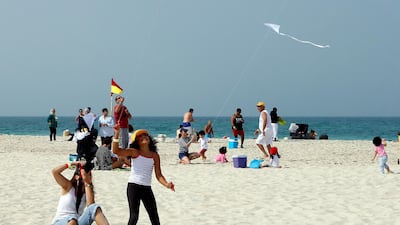The Beatles once sang: "Here comes the sun". But in Abu Dhabi, where I can now drive with the window open for the first time in ages, I find myself singing: "Here comes the cool." This happens to me every year. As the UAE temperature starts to fall, my mood begins to rise.
Seasons and moods have long been linked. The idea of seasonal affective disorder (SAD) was first described back in 1984 and was officially included in widely used diagnostic manuals in 1987. Mostly experienced by women, who comprise around 80 per cent of people living with the condition, SAD is typically defined as a recurring pattern of depressive episodes that come on in autumn or winter and ease in spring or summertime. It is also associated with hypersomnia (excessive sleeping) and weight gain. You could say that it is almost as if those affected are trying to hibernate and sleep through periods of intemperate weather.
To date, most of the research on SAD has taken place in countries in the northern hemisphere, where days get much shorter as winter approaches. This has given rise to ideas about a lack of daylight and reduced levels of vitamin D, which is produced by the body in response to exposure to sunshine, playing a role in SAD. Beyond antidepressants, common treatments include phototherapy − sitting in front of a bright light − and vitamin D supplements.
In the UAE, however, daylight hours do not vary a great deal, and clear blue skies and sunshine are pretty much a given. That said, temperatures can reach 48°C during summer months, making avoidance of the outdoors during daylight hours a habit for many of us. Given this seasonal behaviour, it seems logical that SAD would follow a reverse pattern in the UAE, with symptoms manifesting themselves in the summer and alleviating in winter.
This is exactly what researchers in the UAE have observed. In one project led by Fatme AlAnouti, associate professor of biochemistry at Zayed University in Abu Dhabi, the research team – of which I was part – recorded an apparent increase in depressive symptoms during the summer, with significantly lower levels in the autumn and winter. This study, published in the International Journal of Mental Health Promotion, also observed a corresponding rise and fall in blood serum levels of vitamin D.
These findings led the research team to develop a new treatment approach, which we decided to call SEBA − sun-enhanced behavioural activation. SEBA is based on a well-established and highly effective psychological treatment for depression, known as behavioural activation. People experiencing depression can often withdraw from the world, stop doing things they used to enjoy and disengage from friends and family. Behavioural activation is a systematic approach to getting those who are living with depression back into the world and helping them to re-establish their former routines. SEBA takes the standard behavioural activation techniques and adds a dose of sunshine, with lots of outdoor activities. Participants also receive guidance in order to ensure that sun exposure does not become excessive and harmful.
We tested the effectiveness of SEBA in a pilot study published last year in the journal Community Mental Health. As expected, compared to a control group, the participants receiving SEBA improved emotionally and also in terms of vitamin D levels. Further research is required, with larger sample groups over longer time frames, to more thoroughly explore the effectiveness of this intervention as a treatment for depressive disorders. However, as common sense might predict, getting out in the sun does appear to make people feel better.
So, while many parts of the world are putting the clocks back and bracing for the SAD season, the UAE is about to enter a happier time. Parks and beaches will teem with life, and alfresco dining will once again be a thing. People will spill out of the malls and even the desert will start to feel less deserted.
This is an excellent point for us to cultivate healthy habits that will elevate our vitamin D levels and help us shake off the summertime blues. I personally intend to make the most of the UAE at her climatic best. Here comes the cool.
Dr Justin Thomas is professor of psychology at Zayed University


